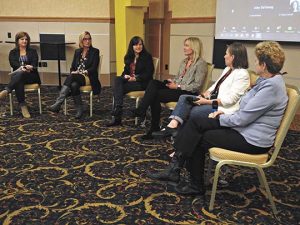by Garrett Neese, Daily Mining Gazette. Published April 8, 2022. Read the original article.

HOUGHTON — Women make up only about a quarter of all employees in information technology and data science.
A panel of women in the field discussed ways to change that, as well as their own career paths and ways to succeed in male-dominated workplaces, during a panel discussion Wednesday on the final day of Michigan Technological University’s computing showcase.
Panelists each took different paths to their current jobs.
A lifelong math and science enthusiast, Cindy Rutyna was advised by a family she babysat for to pursue electrical engineering. She took vocational classes in high school, then earned a bachelor’s degree in electrical engineering from Tech. She combined that with another passion — cars.
Rutyna has been in the automotive industry for 31 years. She is now FNV4 Zonal Module supervisor for vehicle software and electronic solutions at Ford.
“My message out there to anyone, male or female, is if you have something you’re good at, and you also have a passion or something you like, bring them together, and you will be very happy,” she said.
Most panelists took more winding routes to their current roles. Elaine Stephens, head of customer engineering at Google, “blindly followed” her brother’s footsteps by getting a physics degree from the Massachusetts Institute of Technology. Wanting to get out of academia, she thought about where her skills would transfer, and pivoted to a consulting firm that did data analytics. After 10 years on the road, she pivoted again, to being the project manager for a company that managed fleets and cars of trucks for other companies.
“Throughout my journey, I’ve pivoted to various different jobs, but each one I’ve taken a skill that’s been relevant to later jobs,” she said.
The knowledge she gained in that job came in handy three jobs later, where her job involved calculating the cost of fuel for moving full truckloads of goods. And the work she did there, modernizing their computer systems and moving into the cloud, has served her well at Google.
She and other panelists talked about the importance of taking note every few months of what new skills they’ve obtained.
“As long as I look at it, I’m still picking up new skills, I’m still enjoying this job, I’m staying,” she said.
The number of women in technology jobs is still well below the 1980s, when they made up about 35% of employees, said Kathi Bellotti, cybersecurity program manager in US Venture Inc. Research. Her company has looked into the deficit, and found two major points of attrition: middle school and the first two years of college. She has found the middle school students are more likely to want to be in clubs with their friends. The middle-school area is especially important, Bellotti said, because adding numbers at that age creates a much larger chance of having a bigger group at college.
She has worked to establish clubs for girls in technology at the middle school level, as well as similar clubs at the college level to build connections.
“We find the guys kind of naturally do it, and the girls are kind of left out,” Bellotti said. “And it’s just nice for them to know that there’s others in that field.”
There’s also an effort to bring in more professional female mentors to build relationships with the college students, Bellotti said.
Panelists also discussed specific obstacles they’d run into in the workplace, whether it was patronizing comments or having their ideas taken with no credit.
When Mari Buche noticed she wasn’t being heard in grad school, she started watching and listening carefully. She was bringing up ideas, but not elaborating, she noticed. By contrast, the guys who credit for the ideas were “bogarting the mic.”
“So I started holding on to the mic a little longer,” said Buche, associate dean and professor of management information systems at Tech’s College of Business. “Make sure that your voice is connected with the idea or make eye contact, pitch the idea. And if it still gets stolen by someone else, go back to it and say, ‘I’m glad you’re building on my idea.’ Just be a little more assertive in those situations.’”
After the panel, panelists stuck around to talk with students who had watched and asked questions.
Maggie Zimmermann, a second-year student double-majoring in marketing and management information systems, is hoping to go into IT sales. She thought Wednesday’s event gave her excellent background about being a woman in a tech field. Her biggest takeaway was the importance of emotional intelligence in work.
“Regardless of age or gender, that is very important in the professional world, and that is like the highlight and the key of success,” she said. “Also, being more assertive, but in a productive and professional manner.”
Jordan Craven, a third-year management information systems student, was interested in hearing varied perspectives on the industry. One comment that resonated with her was about the need to make students’ technological achievements as cool as sports. As a student-athlete in track and field at Tech, she feels like she has the best of both worlds.
“If you’re passionate about this, that should be celebrated, whether it’s sports or technology,” she said.
Craven said the computing showcase can help introduce students to role models in their fields.
“Somebody may be coming to this not having that mentorship experience previously,” she said. “It could be really beneficial for them to hear some of the things that were said and help them make those connections.”